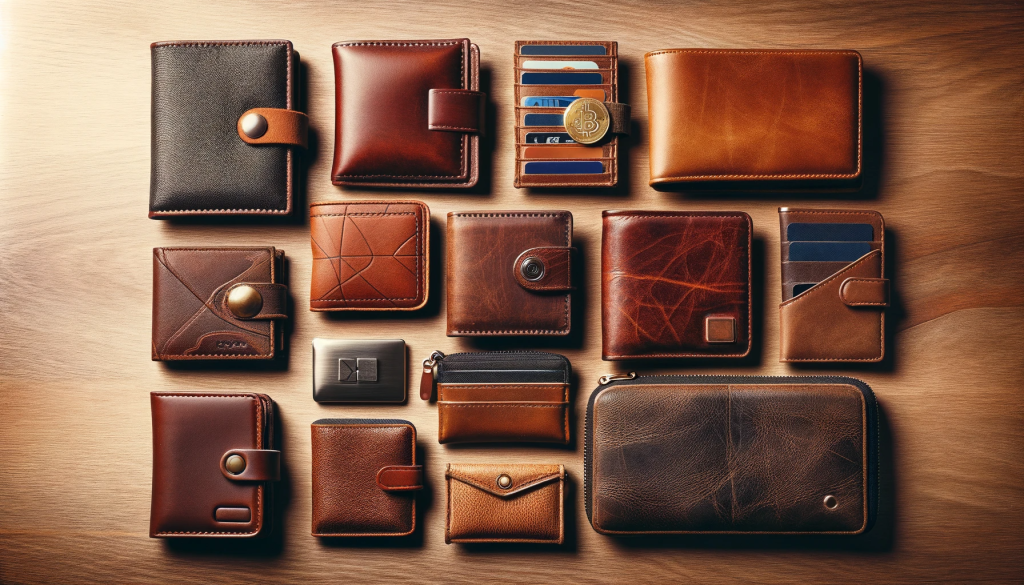How to Choose Your Cryptocurrency Wallet: An Essential Guide

How to Choose a Cryptocurrency Wallet: Your Essential Guide
In the ever-evolving landscape of digital currencies, a robust cryptocurrency wallet is not just a convenience—it’s a necessity. A cryptocurrency wallet is far more than a simple storage solution; it’s the gateway to your digital transactions, offering a balance between accessibility and security. With the burgeoning array of wallet options, the decision can be overwhelming. This guide demystifies the process, equipping you with the knowledge to choose a wallet that aligns with your needs, enhances your trading efficiency, and fortifies your digital wealth against threats.
As we delve into the intricate world of cryptocurrency wallets, we’ll explore the varied types available—from the physical security of hardware wallets to the sleek functionality of software wallets and the old-school simplicity of paper wallets. Each type serves a distinct purpose and offers a unique combination of features to suit different usage patterns. Whether you’re a seasoned crypto-enthusiast or new to the blockchain, understanding these distinctions is crucial in selecting a wallet that not only provides top-notch security but also aligns with your investment strategies and lifestyle.
Understanding Different Types of Cryptocurrency Wallets

Choosing the right cryptocurrency wallet is akin to picking a personal banker for your digital currencies. It’s a decision that should be made with care and consideration of various factors. Here’s a breakdown of the primary wallet types to help you navigate your choices.
Hardware Wallets
Imagine a vault that fits in the palm of your hand—this is the essence of a hardware wallet. Designed like a USB device, hardware wallets store your cryptocurrency offline, providing a fortress against online hacking attempts. They are the go-to choice for holding large amounts of cryptocurrency due to their enhanced security features. However, they come with a price tag, and their physical nature means they can be lost or damaged. Weighing their virtually impenetrable security against their cost and potential inconvenience is a vital part of your wallet selection process.
Software Wallets
Software wallets are applications that reside on your digital devices—be it a desktop computer, a mobile phone, or online. They offer a more convenient way to access and manage your funds with just a few clicks or taps. Desktop wallets provide you control over your keys on a single device, while mobile wallets bring portability to your fingertips. Online or web wallets offer ultimate convenience, accessible from any device with internet connectivity. However, the convenience of software wallets must be balanced with vigilance, as their internet connectivity does make them susceptible to malware and phishing attacks.
Paper Wallets
A paper wallet is the physical embodiment of cryptocurrency minimalism—a piece of paper on which a public address and a private key are printed, often in the form of QR codes. This wallet type is impervious to online hacking threats and can be a safe haven for your assets, as long as it is kept secure and private. The simplicity of a paper wallet can be its greatest strength and its Achilles’ heel; without the bells and whistles of tech-based alternatives, they require a thorough understanding of cryptocurrency transactions to avoid potential user errors during funds transfer.
Hot Wallets – Convenience vs. Risk
Hot wallets are connected to the internet, offering ease of access and quick transactions. They are ideal for active traders and those making frequent transactions. However, this convenience comes with increased risk, as they are more susceptible to online attacks and unauthorized access. Users must weigh the convenience of having their assets readily available against the potential security threats that accompany internet connectivity.
Cold Wallets – Security at the Cost of Accessibility
In contrast, cold wallets are offline storage options. They provide a higher level of security since they are inaccessible to online hackers. Hardware wallets (physical devices) and paper wallets (printouts of private keys and public addresses) are common forms of cold storage. The trade-off here is accessibility; to make a transaction, you need to connect your cold wallet to a computer or enter your key information, which can be less convenient than the instant access a hot wallet provides.
Custodial vs. Non-Custodial Wallets – Who Holds the Keys?
The difference between custodial and non-custodial wallets centers on who controls the wallet’s private keys. With custodial wallets, a third party holds the keys, simplifying the recovery process if you forget your password but also meaning you’re trusting someone else with your assets. Non-custodial wallets give you full control over your keys—and thus your funds—placing the onus of security and key management squarely on your shoulders.
Specialized Wallets – Tailored for Specific Needs
Some wallets are designed for specific cryptocurrencies, offering optimized features and enhanced security for those particular assets. Others are made for staking, participating in initial coin offerings (ICOs), or providing anonymity. These specialized wallets cater to niche requirements and might be the right fit if you have specific intentions for your cryptocurrency usage.
Security Measures and Considerations

Security should be at the forefront of any decision regarding cryptocurrency storage. This section delves into the critical security features that safeguard your digital assets.
Encryption and Security Protocols
Encryption is the bedrock of digital security. When assessing wallets, look for those that utilize robust encryption methods, such as AES-256, which is a military-grade encryption standard. This encryption secures your wallet’s private keys, which are necessary to authorize cryptocurrency transactions. Without strong encryption, your wallet is vulnerable to cyber-attacks and unauthorized access.
Two-Factor Authentication (2FA)
Two-factor authentication adds an additional layer of security. It requires not only something you know (like a password) but also something you have (such as a mobile device). This means even if your password is compromised, an attacker still needs your second factor to access your wallet. Wallets that support 2FA significantly mitigate the risk of unauthorized access.
Multi-Signature Wallets
Multi-signature wallets require multiple private keys to authorize a single transaction. They are ideal for organizations or groups where funds should not be moved without consent from several parties. This feature also provides an additional security layer, as compromising one key won’t be enough to access the funds.
Backup Features
Effective backup mechanisms are crucial. If you lose access to your wallet—whether through hardware failure, loss, or theft—a backup allows you to recover your funds. Look for wallets that offer secure and straightforward backup options, like seed phrases, which can restore your wallet’s contents to a new device if necessary.
User Experience and Functionality

A wallet’s design can greatly affect your day-to-day interaction with your cryptocurrency. In this section, we’ll explore the factors that contribute to a seamless and productive user experience.
Interface Design and Ease of Use
An intuitive user interface is especially important for those new to cryptocurrency. Wallets that prioritize user experience with a clean, logical design can simplify the often complex processes of managing and transacting in digital currencies.
Cross-Platform Compatibility
Wallets with cross-platform compatibility ensure that you have access to your funds whether you’re on a desktop computer, a mobile phone, or a tablet. This flexibility allows for a seamless transition between devices, which is essential in today’s multi-device world.
Customer Support and Community
Reliable customer support can be a lifesaver when issues arise. The availability of prompt and helpful support should be a key consideration. Moreover, a vibrant community can offer additional support, share resources, and foster confidence in the use of the wallet.
Additional Features
Some wallets offer features that enhance the user experience, like in-built exchanges, allowing for the easy conversion between different cryptocurrencies, or support for staking, which can provide additional income from your holdings. When selecting a wallet, consider which additional features align with your investment strategy and goals.
Cost Considerations Concerning Your Cryptocurrency Wallet
Understanding the potential costs associated with different wallets is essential for making a cost-effective decision.
Wallet Purchase Price
While many software wallets are free, hardware wallets come with an upfront cost. However, the price is often justified by the enhanced security that such devices offer. Evaluate what level of security you need in relation to the amount you’re willing to spend.
Transaction Fees
Transaction fees vary among wallets and can accumulate over time. These fees are used to process transactions on the network. It’s important to understand how these fees are calculated and how they can impact your overall investment, especially if you transact frequently.
Service Fees
Some wallets may charge for additional services. This could include fees for currency conversion, using an in-built exchange, or other premium features. Always assess whether these services are necessary for your needs and worth the additional cost.
The right cryptocurrency wallet balances security, functionality, user experience, and cost. By considering the points outlined in this guide, you can choose a wallet that not only secures your assets but also aligns with your usage habits and financial goals. As the cryptocurrency ecosystem evolves, so too do wallet technologies, so stay informed and adaptable to new developments.
Finalizing Your Cryptocurrency Wallet Choice

As you stand at the crossroads of deciding on the right cryptocurrency wallet, consider the amalgamation of security, functionality, user experience, and cost. It’s a decision that doesn’t just involve safeguarding your digital assets but also aligns with your daily interaction with the cryptocurrency world and your broader financial strategies.
Continuous Education and Vigilance
The realm of cryptocurrency is ever-evolving, and staying educated on the latest security trends and wallet updates is paramount. Continuous learning will help you make informed decisions and take proactive steps to protect your investments.
Adapting to Technological Advances
As technology progresses, so do the features and security measures of cryptocurrency wallets. Be prepared to adapt and potentially switch wallets to ensure you are using the best tools available to secure your assets.
Balancing Needs with Features
There is no one-size-fits-all wallet. Your perfect wallet should correspond to your personal needs, whether you prioritize ease of use, advanced security features, or cost-effectiveness. Reflect on your cryptocurrency dealings and choose a wallet that balances your requirements with the features it offers.
Making the Decision
With the knowledge of different wallet types, security measures, user experiences, and costs, it’s time to make your choice. Weigh the pros and cons of each option, and remember that your decision isn’t set in stone. As your investment strategy evolves, so too can your choice of wallet.
Implementation and Usage
After selecting a wallet, the next step is implementation. Set up your wallet with strong security measures in place, such as a complex password and two-factor authentication. Test your backup solutions to ensure that you can recover your wallet if necessary.
Ongoing Security Practices
Finally, adopt a routine of regular security checks and updates. Keep your software up to date, be wary of phishing attempts, and regularly monitor your accounts for any unauthorized activity. Good security is an ongoing commitment.
Final Thoughts
Choosing a cryptocurrency wallet is a critical step in your journey with digital currencies. By using this guide as a roadmap, you can navigate the complexities of wallet selection with confidence. Remember, the choice you make should reflect your personal needs, security requirements, and the ever-changing landscape of cryptocurrency technologies. With the right wallet, you’re not just choosing a tool; you’re taking a step towards mastering the digital economy.







